初中英语常见的同义词或同义词组
- 格式:doc
- 大小:62.00 KB
- 文档页数:26
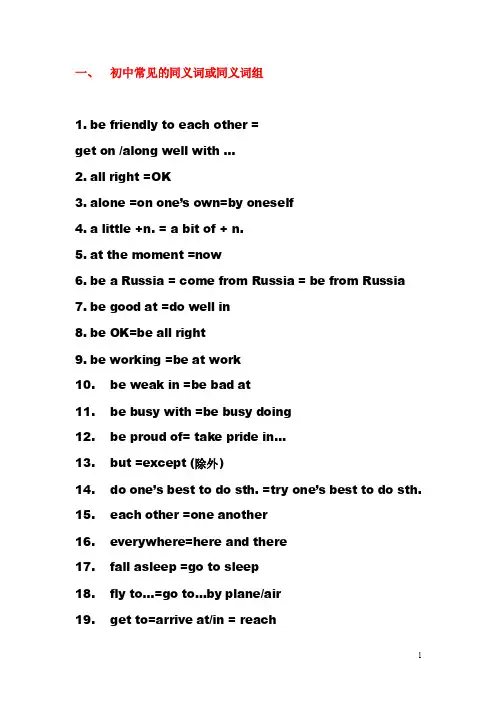
一、初中常见的同义词或同义词组1.be friendly to each other =get on /along well with …2.all right =OK3.alone =on one’s own=by oneself4.a little +n. = a bit of + n.5.at the moment =now6.be a Russia = come from Russia = be from Russia7.be good at =do well in8.be OK=be all right9.be working =be at work10.be weak in =be bad at11.be busy with =be busy doing12.be proud of= take pride in…13.but =except (除外)14.do one’s best to do sth. =try one’s best to do sth.15.each other =one another16.everywhere=here and there17.fall asleep =go to sleep18.fly to…=go to…by plane/air19.get to=arrive at/in = reach20.have a good time =enjoy oneself=have fun21.have enough money for…=afford to buy …22.just now=a moment ago23.learn …by oneself=teach oneself24.leave…=be away from25.look after =take care of26.mean…=the meaning of27. more than=over28. not again=no more=not any more29. prefer sth. to sth.=like sth. better than sth.30. receive a letter from sb.=hear from sb.31. ring (up)sb.=call (up)sb.=phone sb.=make a phone call to sb.32. say no to sb.=refuse sb.33. sleep well=have a good sleep34. see a film=go to the cinema35. start(开始)=begin36. start(出发)=set out37. take a car to go to sp.=go to sp. by car38.take part in=be in39. visit sp. =pay/ have a visit to sp.40. catch the bus=take the bus二、反义词或反义词组的替换1. after=before2. (A) borrow …from (B) -(B) lend…to…(A)3. catch up with-fall behind4. catch the bus-miss the bus5. early-late6. easy-difficult7. find-lose8. get off-get on9. in front of-behind10. miss=catch11. near -far away from12. remember-forget13. something/anything-nothing14. switch off-switch on /turn on15. the same as-different from16. write to sb. -hear from sb.三、形容词、副词比较级的不同形式的替换1.He is as tall as I . =He is the same height as I .2. He is as old as I .=He is the same age as I .3. This box is as heavy (long,wide,deep)as that one.= This box is the same weight(length, width, depth) as that one.4. Bill did better than Lin Tao.=Lin Tao did not do so well as Bill.5. I haven’t as many story-books as he.=He has more story-books than I .6. Japanese is not so popular as English.=Japanese is less popular than English.7. It’s so important a match that we must see it.==It’s such an important match that we can't miss it.常见形容词/副词/的句型1. as +形容词/副词+asthe same+名词+as2. not so (as) +形容词/副词+as形容词/副词比较级 +thanless +形容词/副词比较级+than3. such a/an +形容词+名词so+形容词+a/an+名词四、合并句子1. too+形容词to do / so…thatHe is very young . He can't carry the box.-He is too young to carry the box.-He is so young that he can't carry the box.2. 形容词/副词+enogh to do…Edison was very clever. He could invent a lot of things. Edison was clever enough to invent a lot of things.3. either…or…You can do this before class, and you can also do it after class.You can do this either before class or after class.4. neither…nor…There is no air on the moon. There is no water on the moon.There is neither air nor water on the moon.5. neither of…Your answer is wrong. My answer is wrong, either. Neither of our answers is right.6. none ofTom hasn't passed the exam. Peter and Ken haven’t passed the exam, eihter.None of the three boys has passed the exam.7. both…and…He knows English. His wife knows English,too.Both he and his wife knows English.8. not only…but also…Mrs. Smith is my teacher. She is also my good friends. Mrs. Smith is not only my teacher,but also my good friend.9.so…that…How fast the little boy is running! I can't catch up with him.The little boy is running so fast that I can't catch up with him.10. without…I won’t work well if you don't help me.I wo n’t work well without your help.11. exceptAll are here, but our English teacher isn't .Everyone is here except our English teacher.12. It is +adj. of sb. to do sth.You help me a lot. You are really nice.It’s really nice of you to help me a lot.13. …if(条件状语从句)The weather won’t be fine tomorrow. We’ll have to stay at home.We’ll have to stay at home tomorrow if the weather won’t be fine.Start before 4 o’clock. Or you may miss your plane. You may miss your plane if you don't start before 4 o’clock.五、单句与复句互换1. so…that…(从句)…too…to do……enough to do…The room is so small that my family can't live in.-The room isn't big enough for my family to live in.-The room is too small for my family to live in.2. find that(从句)find sb. +宾语补语We found (that) he is a good pupil.We found him a good pupil.3. …what/where/when/how(从句)…what/where/when/how to do…-Please tell me where we show our tickets. -I am not sure what I should do next.-Please tell me where to show our tickets. -I am not sure what to do next.4. hope that (从句)hope to do …I hope that I can see you soon.I hope to see you soon.5. It is …(some time) since (从句)did…some time agoSb. has been…for some time-It is ten years since his grandfather died. -It is five years since she became a nurse. -His father died ten years ago.-She has been a nurse for five years.6. It seems (seemed) that (句子)Sb. seems(seemed) to do sth.It seemed that they won the match.They seemed to win the match.7. It took sb. + some time + to do sth.Sb. spent+some time+(in) doing sth.It took me two hours to buy the book yesterday.I spent two hours reading the book yesterday.8. sb. spend + some money +on/doing sth.Sb. pay+some money +for sth.Sth. cost +sb. +some moneyHe spent 180 yuan on that toy.-He paid 180 yuan for the toy.-The toy cost him 180 yuan.9. If…, you’ll…Do…, or…If you don't hurry up, you’ll miss the train.Hurry up, or you’ll miss the train.10. It is +形容词+of sb. to do sth.Sb. is +形容词to do sth.It is very kind of you to help me with my maths. You are kind to help me with my maths.六、意思相同或相近的句型的替换-What’s the weather like today?- How is the weather today?- What do you think of Shenzhen?-How do you like Shenzhen?七、改写句子专项训练I.同义句或同义词组的替换训练题1.I don't have enough money to buy the dress.=I can't afford (to buy) the dress.2. Lily learned Chinese all by herself.=Lily taught herself English.3. Did you sleep well last night?=Did you have a good sleep last night?4. She lived alone.=She lived by herself/ on her own.5. I said no to him.=I refused him.6. I did my best to study English.=I tried my best to study English.7. I don't know the meaning of this word.=I don’t know what this word means.8. I am going to fly to Beijing next week.=I am going to Beijing by air/plane next week.9. They often go to see a film on Sunday evenings.=They often go to the cinema/ the movies on Sunday evening.10. Which sport are you in today?=Which sport do you take part in today?11. He usually goes to work by bike.=He usually rides to work.12. I won’t do it again.=I am not going to do it any more.13. He is a Russian.=He is from Russia.14. He is looking for his pen everywhere?=He is trying to find his pen here and there.15. The man reached Beijing yesterday.=The man arrived in Beijing yesterday.16. Every day, Yao Ming receives letters from thousands of baketball fans.=Every day, Y ao Ming hears from thousands of basketball fans.17.The foreigners have visited the Great Wall.=The foreigners have been to the Great Wall.18. Mr. Brown left London six years ago.=Mr. Brown has been away from London for six years.=It is six years since Mr. Brown left London.19. Mr. Smith is working.=Mr. Smith is at work.20. Lin Feng is weak in English.==Lin Feng is bad at English.==Lin Feng isn’t good at English.21. The boy will be OK if I do one small operation on him.=The boy will be all right if I do one small operation on him.22. Jim rang you up a moment ago.=Jim called you just now.=Jim made a phone call to you just now.23. They are playing football now.=They are playing football at the moment.24. Did your parents have a good time in Shenzhen?=Did your parents enjoy themselves in Shenzhen?25. Jane prefers English to maths.=Jane likes English better than maths.26. The Smiths flew to London for their holiday yesterday afternoon.=The smiths left for London by air for their holiday yesterday afternoon.27.Jim went to see me last week.=Jim visited me last week.28. The nurse looks after the baby carefully.=The nurse takes care of the baby carefully.29. Can you look after my dogs when I’m away?=Can you take care of my dogs when I’m not here /at home?30. The boy wanted a little milk to drink.=The boy needed a little milk to drink.=The boy wanted to drink a little milk.31. Mother was busy with some housework when I got home.=Mother was busy doing some housework when I got home.32. The boy’s teacher was very proud of him.=The boy’s teacher took pride in him.=The boy was the pride of his teacher.33. He couldn't fall asleep all night.=He wasn’t able to go to sleep all night.34. My mother went to Guangzhou last week, and she is there now.=My mother has been in Guangzhou since last week.35. The children are wearing beautiful clothes.=The children are in beautiful clothes.II.反义词或反义词组训练1. Her parents haven’t written to their daughter for a long time.=The daughter hasn’t heard from her parents for a long time.2. Remember to turn off the lights when you leave the room.=Don’t forget to turn off the lights when you leave the room.3. I think it is different from Chinese names.=I don’t think it is the same as Chinese names.4. If you don't hurry up, you’ll miss the early bus.=Hurry up, and you’ll catch the early bus.5. Can I borrow a knife from you?=Can you lend a knife to me?=Can you lend me a knife?6. The runner couldn't catch up with the others in the race.=The runner fell behind the others in the race.7. He can't hear anything.=He can hear nothing.8. The station is near the bus stop.=The station is not far from the bus stop.9. They knew something about it only after you told them.=They knew nothing about it before you told them. 10. The tree is behind the house.==The house is in front of the tree.11. Summer comes after spring.=Spring comes before summer.12. I think he is wrong.=I don’t think he is right.13. Remember me to your parents.=Don’t forget me to your parents.=Give my regards to your parents.14. May I borrow your bike?=Can you lend your bike to me?15. My computer is not the same as yours.=My computer is different from yours.16. Lily didn't go to school yesterday, Lucy didn't go to school, either.=Neither Lily nor Lucy went to school yesterday.III.形容词、副词比较级的训练题1.The earth is bigger than the moon.=The moon is smaller than the earth.2. Jim is not so careful as Bob.=Jim is more careless than Bob.=Bob is more careful than Jim.3. Jim runs faster than any other student in his class. =Jim runs the fastest in his class.4. I don't think history is as interesting as art.=I think history is less interesting as art.=I think art is more interesting as history.5 .Jim runs faster than the other students in his class. =Jim runs the fastest in his class.=Jim runs faster than any other student in his class.IV. 合并句子训练题1 . I don't want any meat. I want some vegetables.=I want some vegetables instead of meat.2 . This shirt doesn't look nice. That shirt doesn't look nice, either.=Neither of these two shirts looks nice.3. He hasn't been to France. She hasn't been to France, either.=Neither she nor she has been to France.4 . The old woman was angry. She couldn't say a word.=The woman was too angry to say a word.=The woman was so angry that she couldn’t say a word.5 . Jane prefers English to maths. So does Ann.=Both Jane and Ann like English better than maths. 6. I am a League member. He is a League member, too. =Both he and I are League members.7 . She is very short. She can't reach the apples on the tree.=She is too short to reach the apples on the tree.=She is so short that she can’t reach the apples on the tree.8 . The room isn't very big. It can't hold a lot of people.=The room is not big enough to hold a lot of people. 9. I don't know Russian. He doesn't know Russian, either.=Neither he nor I knows Russian.10. The hat is too big for me, and that one is too small for me.=The two hats are either too big or too small for me.11. We can't finish the work if you don't help us.=We can’t finish the work without your help.12. Hurry up, or we’ll miss th e early bus.=If we don’t hurry, we won’t catch up with the early bus.1 3 . You may answer my question in English, or you may answer it in Chinese.=You may answer my question either in English or in Chinese.1 4 . Mr. White is a teacher. He is also a musician.=Mr. White is not only a teacher, but also a musician.1 5 . He was very careful in the exam. Then he made few mistakes.=He was so careful in the exam that he didn’t make any mistakes.1 6 . He’s too young to go to school.=He is not old enough to go to school.1 7 . When he was young, he could not read. And he could not write, either.=He could neither read nor write when he was young.1 8 . He heard a boy crying for help outside, then he rushed out of the room.=He rushed out of the room as soon as he heard a boy shouting for help outside.1 9 . I have something to tell you. It’s interesting.=I have something interesting to tell you.2 0. Her father can't help her with her lessons, and her mother can't , either.=Neither her father nor her mother can help her with her lessons.V. 单句与复句的互换训练题1. I don’t know what I should say at the meeting.=I don’t know what to say at the meeting.2. Lucy took a basket and went out of the house.=Lucy went out of the house with a basket.3. Could you tell me how to get to the post office?=Could you tell me how I can get to the post office?4. The teacher told us that we would not meet at the school gate.=The teacher told us not to meet at the school gate.5. He told me that I should not make any noise in the library.=He told me not to make any noise in the library.VI.意思相同或相近的句型的替换训练题1.How do you like our city?=What do you think of our city?2. How is the weather today?=What’s the weather like today?3. What’s wrong with you?=What’s the matter with you?4. It is time for class.=It is time to have class.5. What a cold day it is today!=How cold it is today!6. He went to bed after his father came back.=He didn’t go to bed until his father came back.=He didn’t go to bed before his father came back.7. Lucy gave Jim the flower at once when she got it. =Lucy gave the flower to Jim as soon as she got it. 8. Mr. Smith has been in China for over ten years.=It is more than ten years since Mr. Smith came to China.9. It took me three hours to finish writing the article. =I spent three hours finishing writing the article.10. I paid over 100 yuan for this dictionary.=I spent 100 yuan on the dictionary.=The dictionary cost me 100 yuan.11. He bought the book two weeks ago.=He has had the book for two weeks.=It is two weeks since he bought the book.12. He can finish the work easily.=It is easy for him to finish the work.13. It’s good for your health to take exercise often.=To take exercise often is good for your health.14. Not all of the people in the USA are rich.=Only some of the people in the USA are rich.15. Maybe they will tidy the garden today.=They may tidy the garden today.16. What’s wrong with you?=What’s the matter with you?17. We had a good time at the party.=We enjoyed ourselves at the party.18. We got to the school at half past seven.=We arrived at school at half past seven.19. Why don’t you do it by yourself?=Why not do it on your own?20. When he was ten years old, the boy died.=The boy died at the age of ten.21. He is as tall as I .=He is the same height as I .22. I spent 60 yuan (in) buying the ticket.=I paid 60 yuan for the ticket.23. Thank you very much for your coming.=It is very kind of you of you to come here.24. I found the film was interesting.=I found the film interesting.25. The teacher told the students that they should not play in the street.=The teacher told the students not to play in the street.26. She didn’t go to work because she was ill.=She didn’t go to work because of his illness.=She was ill, so she didn’t go to work.27. The box is too heavy for me to carry.=The box is not light enough for me to carry.=The box is so heavy that I can’t carry it.28. The boy is only ten, but he speaks English very well.=Although the boy is only ten, he speaks English very well.29. There are three buildings in the school.=The school has three buildings30. The leaves became yellow.=The leaves turned yellow.31. Don’t forget me to your parents.=Remember me to your parents.32. You are right to do so.=It’s right for you to do so.33. We had a good time.=We enjoyed ourselves.34. He plays tennis well. She plays it well, too.=Both he and she play tennis well.35. I don’t speak Japanese and he doesn’t speakJapanese, either.Neither he nor I speak Japanese.36. He did not go until night.He left at night.37. I was too excited to go to sleep.I was so excited that I couldn’t go to sleep.38. If you don’t get up early, you’ll be late.Get up early, or you’ll be late.39. I forgot I had locked the door.I forgot locking the door.40. He paid 20 dollars for the dictionary.-He spent 20 dollars on the dictionary.-The dictionary cost him 20 dollars.41. English is not so difficult as maths.-English is less difficult than maths.-Maths is more difficult than English.42. It’s dangerous to climb that tall tree.To climb that tall tree is not safe.43. Miss Zhao went to look after the man hurriedly. -Miss Zhao went to take care of the man in a hurry.44. The snow was heavy last night.It snowed heavily last night.45. How old are you?What is your age?46. Our teacher left the lab after he had got everything ready.Our teacher didn’t leave the lab until he had got everything ready.47. It took us two days to prepare for the English evening.We spent two days getting ready for the English evening.48. We came home when it was six o’clock.We came home at six o’clock.49. The dictionary cost me 106 yuan.I paid 106 yuan for the dictionary.50. He went on reading the book.-He didn’t stop reading the book.。
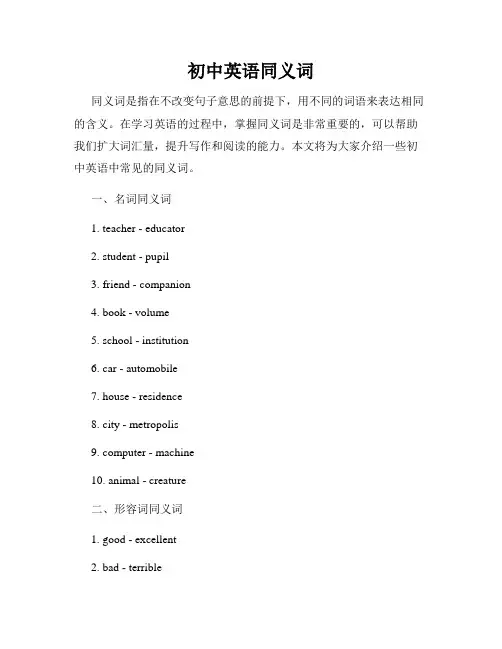
初中英语同义词同义词是指在不改变句子意思的前提下,用不同的词语来表达相同的含义。
在学习英语的过程中,掌握同义词是非常重要的,可以帮助我们扩大词汇量,提升写作和阅读的能力。
本文将为大家介绍一些初中英语中常见的同义词。
一、名词同义词1. teacher - educator2. student - pupil3. friend - companion4. book - volume5. school - institution6. car - automobile7. house - residence8. city - metropolis9. computer - machine10. animal - creature二、形容词同义词1. good - excellent2. bad - terrible3. happy - joyful4. sad - unhappy5. beautiful - gorgeous6. ugly - unattractive7. big - large8. small - little9. interesting - engaging10. difficult - challenging三、动词同义词1. go - travel2. see - observe3. eat - consume4. talk - converse5. help - assist6. study - learn7. play - participate8. write - compose9. read - peruse10. sleep - slumber四、副词同义词1. very - extremely2. quickly - rapidly3. slowly - gradually4. well - skillfully5. often - frequently6. always - consistently7. never - nervertheless8. here - there9. now - presently10. also - as well五、连词同义词1. and - furthermore2. but - however3. or - alternatively4. because - since5. if - in case6. although - though7. so - therefore8. yet - nevertheless9. while - whereas10. when - as总结:通过掌握初中英语中常见的同义词,我们可以丰富词汇,使语言更加有表现力。
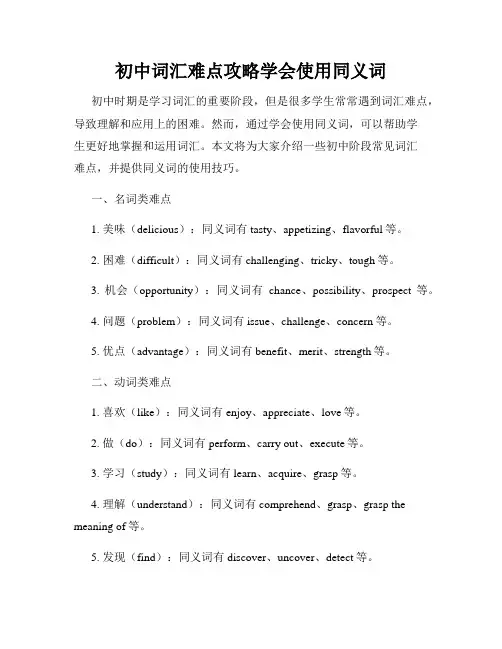
初中词汇难点攻略学会使用同义词初中时期是学习词汇的重要阶段,但是很多学生常常遇到词汇难点,导致理解和应用上的困难。
然而,通过学会使用同义词,可以帮助学生更好地掌握和运用词汇。
本文将为大家介绍一些初中阶段常见词汇难点,并提供同义词的使用技巧。
一、名词类难点1. 美味(delicious):同义词有tasty、appetizing、flavorful等。
2. 困难(difficult):同义词有challenging、tricky、tough等。
3. 机会(opportunity):同义词有chance、possibility、prospect等。
4. 问题(problem):同义词有issue、challenge、concern等。
5. 优点(advantage):同义词有benefit、merit、strength等。
二、动词类难点1. 喜欢(like):同义词有enjoy、appreciate、love等。
2. 做(do):同义词有perform、carry out、execute等。
3. 学习(study):同义词有learn、acquire、grasp等。
4. 理解(understand):同义词有comprehend、grasp、grasp the meaning of等。
5. 发现(find):同义词有discover、uncover、detect等。
三、形容词类难点1. 高兴(happy):同义词有pleased、delighted、content等。
2. 暴力(violent):同义词有aggressive、brutal、fierce等。
3. 美丽(beautiful):同义词有gorgeous、lovely、stunning等。
4. 聪明(smart):同义词有intelligent、bright、clever等。
5. 害怕(fearful):同义词有terrified、frightened、scared等。
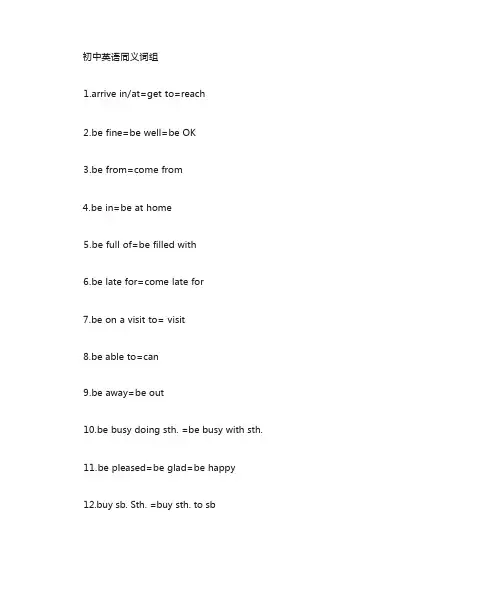
初中英语同义词组1.arrive in/at=get to=reach2.be fine=be well=be OK3.be from=come from4.be in=be at home5.be full of=be filled with6.be late for=come late for7.be on a visit to= visit8.be able to=can9.be away=be out10.be busy doing sth. =be busy with sth.11.be pleased=be glad=be happy12.buy sb. Sth. =buy sth. to sb13.be up=get up14.catch up with=keep up with15.catch a bus=take a bus16.catch a cold=have a colde into=step intoe on=come alonge down=get down20.do well in=be good at21.do the shopping=go shopping22.dropoff=get off23.enjoy doing sth. =like doing sth.24.have a good time=enjoy oneself25.fall down=fall off26.get the telephone=answer the telephone27.give sb.sth. =give sth.to sb.28.give sb.the message=give the message to sb.29.give sb. a talk=give a talk to sb.30.give a concert=have a concert31.get on well with sb. =be good to32.give…a call=give…a ring33.go down=go along34.go for a swim=go swimming35.go on doing sth. =go on with sth.36.go up=go along37.go to sleep=get to sleep=fall asleep38.have a look (at)=look at39.have a swim=go swimming40.have got=have41.hear from=receive a letter from=have a letter from=get a letter from42.help sb with sth=help sb to do sth43.hold a meeting=have a meeting44.hold on=wait a minute45.hurry up=be quick46.knock at=knock onst from…to=be from…to48.like doing sth=like to do sth49.look out=be careful50.love to do sth=like to do sth51.make upone’smindtodo=set one’smindtod o52.pay for=spend on53.prefer… to=like b etter than54.ring up=call sb55.send for sb=ask sb to come56.show sb sth=show sth to sb57.take care of=look after58.take exercise=do sport59.take a message=leave a message60.think about=think of61.teach oneself=learn all by oneself62.turn off=turn down63.turn right at the…crossing=take the …turning on the right64.walk on=go on65.walk to=go to …on foot66.walk along=go along67.at school=in the school68.a lot of=lots of69.a lot=very much70.a quarter past two=two fifteen71.at times=sometimes72.at last=in the end=finally73.a bit=a little=a few74.a moment ago=just now75.at once=right now76.at noon=in the middle of a day77.at that moment=at that time=just then78.at the moment=at the same time79.at the doctor’s=in the doctor’s office80.all over the world=across the world=around the world=in the world81.a moment later=later on82.after a while=a moment later83.all the same=all the time84.as soon as possible=as quick as possible85.in line=in a queue86.in the southern part of=in the south of87.in the day=in the daytime88.much of China=many places of China89.more than=over90.no longer=not…any longer=no more=not any more91.not far from=near to92.North China=the north of China93.of course=certainly94.plenty of=quite a few=a lot of=lots of=large number of=a great many of=agood deal of95.two and a half years=two years and a half初中英语同义词组1. arrive in/at=get to=reachI arrived at the airport at 10. =I reach the airport at 10. 注意这里不能用 arrive in2. be fine=be well=be OKI’m fine=I’m well. =I’m OK.3. be from=come fromHe is from China. =He comes from China.4. be in=be at homeHe is in. =He is at home. 同理:be out= be not at home5. be full of=be filled withThe bottle is full of orange. =The bottle is filled with orange.6. be late for=come late forI’m sorry, I’m late for the meeting. =I’m sorry, I come late for the meeting.7. be on a visit to= visitHe is on a visit to China. = He is visiting China8. be able to=canHe was able toride a bike at the age of 5. =He couldride a bike when he was 5.9. be away=be out=be not at home10. be busy doing sth. =be busy with sth.He is busy doing his homework. =He is busy with his homework.11. be pleased=be glad=be happyThe coach was pleasedwith their performance. =The coach was gladwith their performance. =The coach was happy with their performance.12. buy sb. Sth. =buy sth. to sbMy mother bought me a book. =My mother bought a book to me.13. be up=get upBeup, Tom!=Get up, Tom.14. catch up with=keep up withI can catch up with others. =I can keep up with others.15. catch a bus=take a busCan I catch a bus?/Can I take a bus?16. catch a cold=have a coldOh,no!Y ou’ve caught a cold.=Oh,no!Y ou’ve hada cold.17. come into=step intoHe came into the classroom. =He stepped into the classroom18. come down=get downCome down! That’sdangerous. =Get down! That’sdangerous.19. do well in=be good atHe does well in swimming. =He is good at swimming.20. do the shopping=go shoppingI’ll do the shopping. =I’ll go shopping.21. dropoff=get off22. enjoy doing sth. =like doing sth.I enjoy reading. =I like reading.23. have a good time=enjoy oneselfWe had a good time at the party. =We enjoyed ourselves at the party.24. fall down=fall offI fell down. =I fell off the bike.25. get the telephone=answer the telephoneI got the telephone. = I answered the telephone.26. give sb.sth. =give sth.to sb.27. give sb.the message=give the message to sb.28. give sb. a talk=give a talk to sb.29. give a concert=have a concertThey gave a concert. =They had a concert.30. get on well with sb. =be good toI got on well with my neighbors=I’m good to my neighbors.31. give…a call=give…a ringI gave a call to you. =I give you a ring.32. go down=go along33. go for a swim=go swimming34. go on doing sth. =go on with sth.35. go up=go along36. go to sleep=get to sleep=fall asleep37. have a look (at)=look at38. have a swim=go swimming39. have got=have40. hear from=receive a letter from=have a letter from=get a letter from41. help sb with sth=help sb to do sth42. hold a meeting=have a meeting43. hold on=wait a minute44. hurry up=be quick45. knock at=knock on46. last from…to=be from…to47. like doing sth=like to do sth48. look out=be careful49. love to do sth=like to do sth50. make upone’smindtodo=set one’smindtodo51. pay for=spend on52. prefer… to=like better than53. ring up=call sb54. send for sb=ask sb to come55. show sb sth=show sth to sb56. take care of=look after57. take exercise=do sport58. take a message=leave a message59. think about=think of60. teach oneself=learn all by oneself61. turn off=turn down62. turn right at the…crossing=take the …turning on the right63. walk on=go on64. walk to=go to …on foot65. walk along=go along66. at school=in the school67. a lot of=lots of68. a lot=very much69. a quarter past two=two fifteen70. at times=sometimes71. at last=in the end=finally72. a bit=a little=a few73. a moment ago=just now74. at once=right now75. at noon=in the middle of a day76. at that moment=at that time=just then77. at the moment=at the same time78. at the doctor’s=in the doctor’s office79. all over the world=across the world=around the world=in the world80. a moment later=later on81. after a while=a moment later82. all the same=all the time83. as soon as possible=as quick as possible84. in line=in a queue85. in the southern part of=in the south of86. in the day=in the daytime87. much of China=many places of China88. more than=over89. no longer=not…any longer=no more=not any more90. not far from=near to91. North China=the north of China92. of course=certainly93. plenty of=quite a few=a lot of=lots of=large number of=a great many of=a good deal of94. two and a half years=two years and a halfthink up=come up withgive out=hand outuse up=run out ofcall up=ring upinstead of=in place oftake after=likeset up=eatablishbe angry with=be mad oflose one's way=get losetry one's best=doone's bestgo to sleep=get to sleep=fall asleepin the end=at last=finally=at the end of make a decision=decide to dobe surprise at=be amazed ateven thought=even ifno long=not...any longertake pride in=be pround ofgive up=stop doingworry about=be worried aboutbe confident of doing=have confidence in doing not....in the slightest=not at allplenty of=lots of=a lot ofget along with=get on withbe anxious about=be worried abouton diaplay=on showwhatever=no matter whatexpect sb. to do=wish sb.to dostay away from=keep away fromconsider doing=think about doingcontinue doing=go on dingtake after=be similar tobe filled with=be full ofat once=right awaydonate...to=give away...tobe used for=be used to doby accident=be chance同义句转换训练是初中英语学习的重点,也是学生学习的难点,同义句转换虽不是中考的专题了,但它可以出现在听力测试、选择题、写作中。
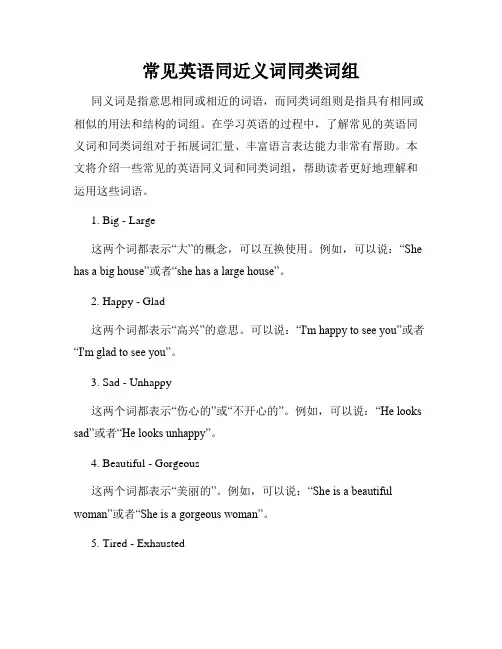
常见英语同近义词同类词组同义词是指意思相同或相近的词语,而同类词组则是指具有相同或相似的用法和结构的词组。
在学习英语的过程中,了解常见的英语同义词和同类词组对于拓展词汇量、丰富语言表达能力非常有帮助。
本文将介绍一些常见的英语同义词和同类词组,帮助读者更好地理解和运用这些词语。
1. Big - Large这两个词都表示“大”的概念,可以互换使用。
例如,可以说:“She has a big house”或者“she has a large house”。
2. Happy - Glad这两个词都表示“高兴”的意思。
可以说:“I'm happy to see you”或者“I'm glad to see you”。
3. Sad - Unhappy这两个词都表示“伤心的”或“不开心的”。
例如,可以说:“He looks sad”或者“He looks unhappy”。
4. Beautiful - Gorgeous这两个词都表示“美丽的”。
例如,可以说:“She is a beautiful woman”或者“She is a gorgeous woman”。
5. Tired - Exhausted这两个词都表示“疲倦的”。
例如,可以说:“I'm tired after a long day at work”或者“I'm exhausted after a long day at work”。
6. Start - Begin这两个词都表示“开始”。
可以说:“Let's start the meeting”或者“Let's begin the meeting”。
7. Help - Assist这两个词都表示“帮助”,可以互换使用。
例如,可以说:“Can you help me with this task?”或者“Can you assist me with this task?”8. Buy - Purchase这两个词都表示“购买”,可以互换使用。
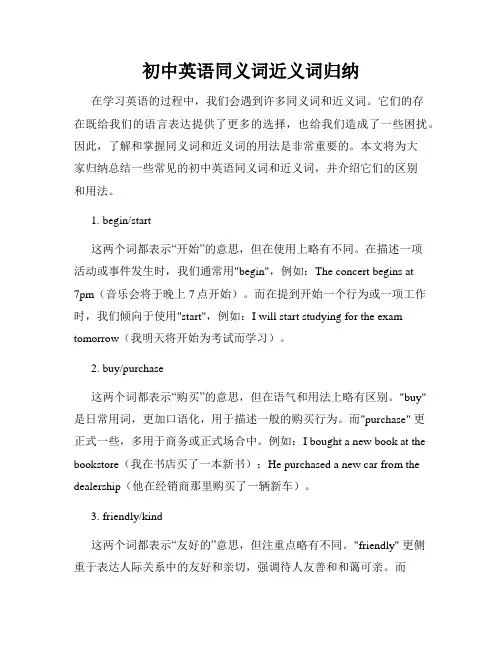
初中英语同义词近义词归纳在学习英语的过程中,我们会遇到许多同义词和近义词。
它们的存在既给我们的语言表达提供了更多的选择,也给我们造成了一些困扰。
因此,了解和掌握同义词和近义词的用法是非常重要的。
本文将为大家归纳总结一些常见的初中英语同义词和近义词,并介绍它们的区别和用法。
1. begin/start这两个词都表示“开始”的意思,但在使用上略有不同。
在描述一项活动或事件发生时,我们通常用"begin",例如:The concert begins at7pm(音乐会将于晚上7点开始)。
而在提到开始一个行为或一项工作时,我们倾向于使用"start",例如:I will start studying for the exam tomorrow(我明天将开始为考试而学习)。
2. buy/purchase这两个词都表示“购买”的意思,但在语气和用法上略有区别。
"buy" 是日常用词,更加口语化,用于描述一般的购买行为。
而"purchase" 更正式一些,多用于商务或正式场合中。
例如:I bought a new book at the bookstore(我在书店买了一本新书);He purchased a new car from the dealership(他在经销商那里购买了一辆新车)。
3. friendly/kind这两个词都表示“友好的”意思,但注重点略有不同。
"friendly" 更侧重于表达人际关系中的友好和亲切,强调待人友善和和蔼可亲。
而"kind" 更强调善良和乐于助人的态度。
例如:She is a friendly personand always greets everyone with a smile(她是一个友好的人,总是带着微笑向每个人打招呼);He is a very kind-hearted person and often helps others in need(他是一个非常善良的人,经常帮助有困难的人)。
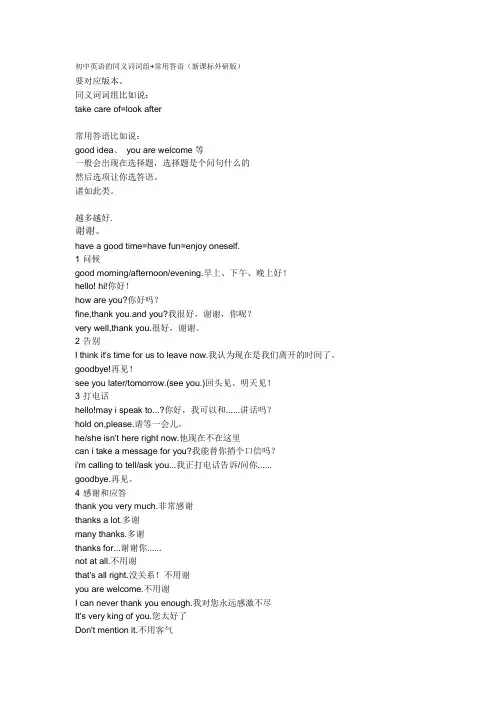
初中英语的同义词词组+常用答语(新课标外研版)要对应版本。
同义词词组比如说:take care of=look after常用答语比如说:good idea、you are welcome等一般会出现在选择题,选择题是个问句什么的然后选项让你选答语。
诸如此类。
越多越好.谢谢。
have a good time=have fun=enjoy oneself.1·问候good morning/afternoon/evening.早上、下午、晚上好!hello! hi!你好!how are you?你好吗?fine,thank you.and you?我很好,谢谢,你呢?very well,thank you.很好,谢谢。
2·告别I think it's time for us to leave now.我认为现在是我们离开的时间了。
goodbye!再见!see you later/tomorrow.(see you.)回头见、明天见!3·打电话hello!may i speak to...?你好,我可以和......讲话吗?hold on,please.请等一会儿。
he/she isn't here right now.他现在不在这里can i take a message for you?我能替你捎个口信吗?i'm calling to tell/ask you...我正打电话告诉/问你......goodbye.再见。
4·感谢和应答thank you very much.非常感谢thanks a lot.多谢many thanks.多谢thanks for...谢谢你......not at all.不用谢that's all right.没关系!不用谢you are welcome.不用谢I can never thank you enough.我对您永远感激不尽It's very king of you.您太好了Don't mention it.不用客气no trouble at all.没什么It's a pleasure./My pleasure.我很乐意that's ok.这没什么5·祝愿·祝贺·应答good luck!祝你好运best wishes to you.给你最美好的祝愿!have a good time.祝你过得愉快!{congratulations!}祝贺你!(这句话经常见,所以很重要!!)all the best.祝你万事如意the best of luck.祝你好运。
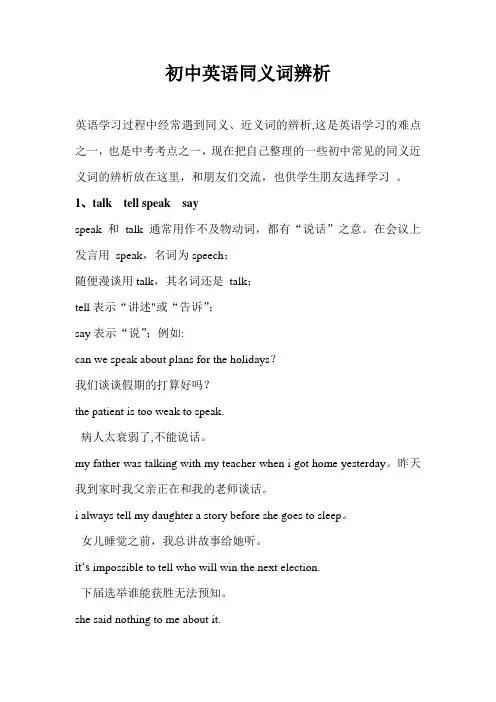
初中英语同义词辨析英语学习过程中经常遇到同义、近义词的辨析,这是英语学习的难点之一,也是中考考点之一,现在把自己整理的一些初中常见的同义近义词的辨析放在这里,和朋友们交流,也供学生朋友选择学习。
1、talk tell speak sayspeak 和talk 通常用作不及物动词,都有“说话”之意。
在会议上发言用speak,名词为speech;随便漫谈用talk,其名词还是talk;tell表示“讲述"或“告诉”;say表示“说”;例如:can we speak about plans for the holidays?我们谈谈假期的打算好吗?the patient is too weak to speak.病人太衰弱了,不能说话。
my father was talking with my teacher when i got home yesterday。
昨天我到家时我父亲正在和我的老师谈话。
i always tell my daughter a story before she goes to sleep。
女儿睡觉之前,我总讲故事给她听。
it‘s impossible to tell who will win the next election.下届选举谁能获胜无法预知。
she said nothing to me about it.关于这一点,她什么也没有对我讲.*speak 当及物动词用时,宾语一般是语言或词语之类的词。
如: does anyone speak english here?这儿有人会说英语吗?2、good well nicegood 形容词,好的,合适的,新鲜的,擅长的。
well 作形容词时,指"(身体)健康的”;还可用作副词,修饰动词。
nice形容词,美好的,令人愉快的,可爱的,特指取悦感官的事物。
she is good at english。
她擅长英语。
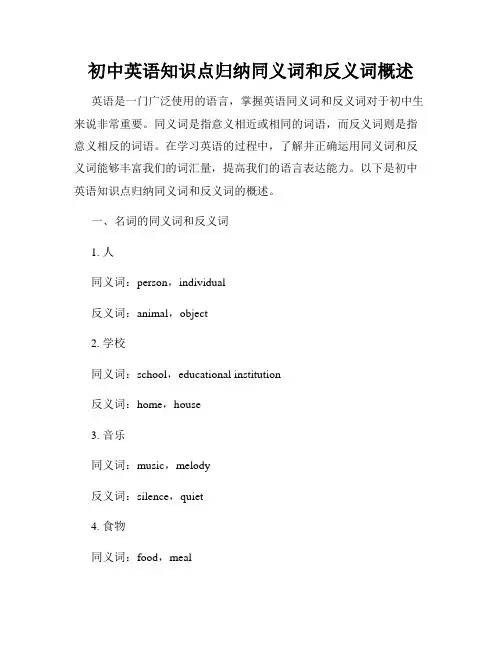
初中英语知识点归纳同义词和反义词概述英语是一门广泛使用的语言,掌握英语同义词和反义词对于初中生来说非常重要。
同义词是指意义相近或相同的词语,而反义词则是指意义相反的词语。
在学习英语的过程中,了解并正确运用同义词和反义词能够丰富我们的词汇量,提高我们的语言表达能力。
以下是初中英语知识点归纳同义词和反义词的概述。
一、名词的同义词和反义词1. 人同义词:person,individual反义词:animal,object2. 学校同义词:school,educational institution反义词:home,house3. 音乐同义词:music,melody反义词:silence,quiet4. 食物同义词:food,meal反义词:hunger,starvation 5. 动物同义词:animal,creature反义词:plant,vegetation二、形容词的同义词和反义词1. 好的同义词:good,excellent反义词:bad,poor2. 高兴的同义词:happy,joyful反义词:sad,unhappy3. 忙碌的同义词:busy,occupied反义词:idle,lazy4. 聪明的同义词:smart,intelligent反义词:stupid,dumb5. 漂亮的同义词:beautiful,gorgeous 反义词:ugly,plain三、动词的同义词和反义词1. 学习同义词:study,learn反义词:forget,neglect2. 听同义词:listen,hear反义词:ignore,disregard 3. 说同义词:say,speak反义词:be silent,keep quiet 4. 看同义词:see,watch反义词:blind,unable to see 5. 做同义词:do,perform反义词:undo,reverse四、副词的同义词和反义词1. 急忙地同义词:quickly,rapidly反义词:slowly,gradually 2. 高兴地同义词:happily,joyfully 反义词:sadly,unhappily 3. 安静地同义词:quietly,silently反义词:noisily,loudly 4. 慢慢地同义词:slowly,gradually 反义词:quickly,rapidly 5. 好好地同义词:well,properly反义词:badly,improperly通过学习以上初中英语知识点归纳的同义词和反义词,我们可以更准确地理解和运用英语词汇,丰富我们的语言表达能力。
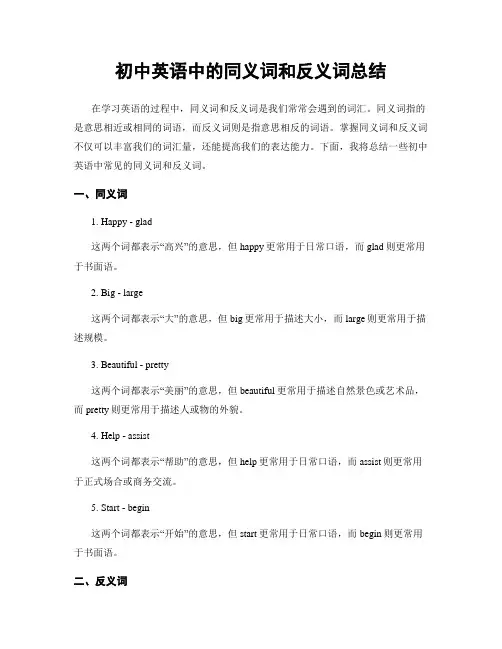
初中英语中的同义词和反义词总结在学习英语的过程中,同义词和反义词是我们常常会遇到的词汇。
同义词指的是意思相近或相同的词语,而反义词则是指意思相反的词语。
掌握同义词和反义词不仅可以丰富我们的词汇量,还能提高我们的表达能力。
下面,我将总结一些初中英语中常见的同义词和反义词。
一、同义词1. Happy - glad这两个词都表示“高兴”的意思,但happy更常用于日常口语,而glad则更常用于书面语。
2. Big - large这两个词都表示“大”的意思,但big更常用于描述大小,而large则更常用于描述规模。
3. Beautiful - pretty这两个词都表示“美丽”的意思,但beautiful更常用于描述自然景色或艺术品,而pretty则更常用于描述人或物的外貌。
4. Help - assist这两个词都表示“帮助”的意思,但help更常用于日常口语,而assist则更常用于正式场合或商务交流。
5. Start - begin这两个词都表示“开始”的意思,但start更常用于日常口语,而begin则更常用于书面语。
二、反义词1. Hot - cold这两个词都表示“热”的意思,但hot表示高温,而cold则表示低温。
2. Fast - slow这两个词都表示“快”的意思,但fast表示速度快,而slow则表示速度慢。
3. Happy - sad这两个词都表示“快乐”的意思,但happy表示高兴,而sad则表示悲伤。
4. Big - small这两个词都表示“大”的意思,但big表示大的,而small则表示小的。
5. Easy - difficult这两个词都表示“容易”的意思,但easy表示简单,而difficult则表示困难。
通过学习同义词和反义词,我们可以提高我们的词汇量,丰富我们的表达方式。
同时,对于初学者来说,通过比较同义词和反义词的使用情境,我们也能更好地理解词汇的用法和语境。
因此,掌握同义词和反义词对于我们的英语学习是非常重要的。
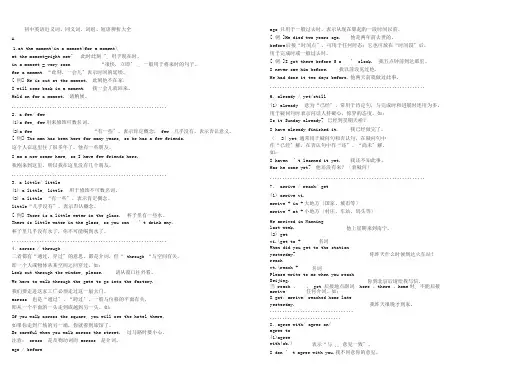
初中英语近义词、同义词、词组、短语辨析大全A1.at the moment\in a moment\for a moment\at the moment=right now" 此时此刻 ", 用于现在时。
in a moment = very soon “很快,立即〞 , 一般用于将来时的句子。
for a moment “此刻,一会儿〞表示时间的延续。
[ 例] He is out at the moment. 此刻他不在家。
I will come back in a moment. 我一会儿就回来。
Hold on for a moment. 请稍候。
.............................................................2.a few/ few(1)a few, few 用来修饰可数名词。
(2)a few “有一些〞,表示肯定概念,few 几乎没有,表示否认意义。
[ 例] The man has been here for many years, so he has a few friends.这个人在这里住了很多年了,他有一些朋友。
I am a new comer here, so I have few friends here.我刚来到这里,所以我在这里没有几个朋友。
.............................................................3.a little/ little(1) a little, little 用于修饰不可数名词。
(2) a little “有一些〞,表示肯定概念。
little “几乎没有〞,表示否认概念。
[ 例] There is a little water in the glass. 杯子里有一些水。
There is little water in the glass, so you can ’t drink any.杯子里几乎没有水了,你不可能喝到水了。
初中英语复习总结同义词经常出现的同义词或近义词1. big = large2. pleased = happy ; glad3. filled with = full of4. begin = start5. less than = lower6. see = notice ; find7. give up = stop8. in length = long9. around = about10. at the beginning of = at the start of11. like = love ; enjoy12. be called = be named13. but = yet14. many = a lot of ; lots of ; a number of15. grow = get / become16. usually = often17. the UK = Britain ; England18. much better = a lot better ; far better19. get back = return20. decide = make decisions21. as well = too ; also22. go on = continue23. per minute = every minute ; each minute24. be like = be similar to25. take part in = enter ; join 26. at present = now ; nowadays27. smart = clever28. finally = in the end ; at last29. present…from = stop…from30.hardly = seldom31. cross = go across32. amazing = surprising33. afraid = frightened34. arrive at / in = reach ; get to35. expensive = not cheap ; dear36. turn…into = change…into37. turn off = switch off38. be to do = will do39. take first place = get the first prize40. several = some ; a few41. movie = film42. no = not any43. usual = common44. tiny = small45. child = kid46. put on plays = act plays47. difficult = hard48. famous = well-known49. so far = until now50. such as = like51. perhaps = maybe52. fairly = very ; quite53. can’t = be unable to54. little = small55. take = carry56. alone = by oneself ; on one’s own57. hold up = raise58. at that time = then59. want = would like60. unclean = dirty61. fun = interesting62. everybody = everyone63. set out = start ; set off64. study = learn65. be over = end66. the same sort of = the same kind/type of67. be raised = grow up68. keep doing = go on doing69. opportunity = chance70. more peaceful = quieter71. 100 percent = all72. have a happy life = live a happy life73. when = while74. get money = make / earn money75. get used to = be used to76. get a call = receive a call77. try one’s best = do one’s best78. quick = fast79. buy = get80. be shocked = be surprised81. eat = have82. beginning (n.) = start83. of course = certainly84. almost = nearly85. receive the prize = win the prize86. complete = finish87. be required = be needed / wanted88. in recent years = recently89. conversations = dialogues90.be responsible for = be in charge of = take charge of = have the duty for91. high winds = strong winds92. scores =marks93. breaks = rest94. woods = forest95. need = want96. come from = be from97. a little = a bit (of)98. at once = right away / right now/ immediately99. research = study100. fortunately = luckily101. at times = sometimes102. bad = terrible103. every day = daily104. because of = thanks to105. about = around106. a huge amount of = much 107. completely = fully108. gift = present109. perform = play110. fall = drop111. here and there = everywhere 112. wealthy = rich113. all over = around / throughout / across 114. sad = unhappy115. no one = nobody 116. go into = enter117. more than = over 118. look after = take care of119. take place = happen120. father and mother = parents121. have to = must 122. just = only123. come up with = think of 124. needn’t = don’t have to125. unhappy = unpleasant126. be in a skirt = be wearing a skirt127. nation = country128. telephone sb = call / phone sb.129. provide sb with sth = offer sb sth130. a couple of = several / a few 131. go up = rise132. one more = another 133. suggest = advise134. reply = answer135. continue = go on135. each other = one another136. if = whether137. make a decision = decide138. go shopping = shop139. at the back of = behind140. in front of = before•注意:在填同义词时,除了要记住替换词之外,也要注意词形的变化,如名词的单复数、动词的时态等。
初中英语近义词、同义词、词组、短语辨析大全-从A ...................................................... .......1.at the moment\in a moment\for a moment\at the moment=right now"此时此刻",用于现在时。
in a moment = very soon “很快,立即”,一般用于将来时的句子。
for a moment “此刻,一会儿”表示时间的延续。
[例] He is out at the moment.此刻他不在家。
I will come back in a moment.我一会儿就回来。
Hold on for a moment.请稍候。
...................................................... .......2.a few/ few(1)a few, few 用来修饰可数名词。
(2)a few “有一些”,表示肯定概念,few 几乎没有,表示否定意义。
[例] The man has been here for many years, so he has a few friends.这个人在这里住了很多年了,他有一些朋友。
I am a new comer here, so I have few friends here.我刚来到这里,所以我在这里没有几个朋友。
...................................................... .......3.a little/ little(1) a little, little 用于修饰不可数名词。
(2) a little “有一些”,表示肯定概念。
little “几乎没有”,表示否定概念。
[例] There is a little water in the glass.杯子里有一些水。
1.关于about=on2.大约about=around3.建议advise=suggest4.建议(n.)advice=suggestion5.害怕的afraid=scared=frightened6.一整年all the year=the whole year7.一直;总是always=all the time8.几乎nearly=almost9.独自alone=by oneself=on one’s own10.回答;回复reply=answer11.出现appear=come along12.全世界all over the world=throughout/across/around the world13.似乎;好像seem=appear14.到达arrive at/in=get to=reach15.当......时when=while=as16.很坏的;极讨厌的awful=bad=terrible17.严重地badly=seriously=terribly18.因为;由于because of=as a result of19.变成become=get20.在......旁边next to=beside=by21.在......附近near =close to22.不但...而且...not only... but also...=both ...and...23.休息(n.)rest=break24.聪明的smart=clever=wise=intelligent=bright25.买buy=get26.被叫做called=named=with the name of27.照顾take care of=look after=care for28.导致;引起cause=lead to =result in29.中心;中央centre=middle30.肯定的;确定的sure=certain31.把......变成.....turn...into=change...into32.高兴的happy=glad=cheerful=pleased33.孩子child=kid34.课class=lesson35.大学university=college36.想出think of=come up with37.普遍的common=usual=ordinary38.比赛(n.)game=competition=match=race39.考虑think about=consider40.继续go on=continue41.正确的correct=right42.制造make=produce43.可爱的cute=lovely44.日常的daily=everyday45.昂贵的expensive=dear46.困难的difficult=hard47.做某事有困难have difficulty/trouble/problems in doing sth.48.晚餐dinner=supper49.发现discover=find50.每一个every=each51.简单的simple=easy52.吃eat=have53.别的什么what else=what other things54.结束finish=end=be over55.玩的开心have a good time=have fun =enjoy oneself56.进入enter=come/go/get into57.每个人;所有人everyone=everybody58.到处everywhere=here and there81.期待做某事expect to do=look forward to doing82.事实上in fact =actually83.著名的famous=well-known=celebrated84.快地fast=quickly=rapidly85.快的fast=quick=rapid86.想要做某事want to do sth=would like to do=feel like doing87.几个;一些a few=some=several88.充满be filled with=be full of89.电影movie=film90.最后;终于in the end =at last =finally91.完成complete=finish92.健康的fit =healthy=in good health93.修理fix=mend=repair94.跟随;听从;服从follow=go after= take=obey95.接下来的next=following96.愚蠢的foolish=stupid=silly97.空闲的free=spare98.友好的friendly=kind99.有趣的funny=interesting100.hear from sb.=get/receive/have a letter from sb.收到某人来信101.礼物gift=present102.归还return=give back103.放弃做某事give up doing sth=stop doing sth104.擅长做某事be good at =do well in +doing105.种植grow=plant106.举手hand up=put up one’s hand=raise one’s hand107.帮助某人help sb.=give sb. a hand108.讨厌hate=dislike109.丝毫不知道have no idea=don’t know110.必须;不得不have to =must111.在某人的帮助下with one’s help=with the help of sb112.有用的useful=helpful113.高的tall=high114.举行have=hold=take place115.假期holiday=vacation116.希望hope=wish hope sb. do sth117.匆忙做某事hurry to do sth.=do sth. in a hurry=do sth. hurriedly 118.是否if =whether119.生病的ill=sick120.重要的important=necessary121.另外;除此之外besides=in addition=what’s more122.也too=as well =also123.和and=as well as =in addition to =besides124.依某人看in one’s opinion=in one’s view=sb. think125.发明;创造invent=create126.工作job=work127.参加join in=take part in=attend128.取笑某人laugh at=make fun of=make jokes about129.只;仅仅only=just130.阻止某人做某事keep sb. from doing sth.=stop sb. (from) doing sth=prevent sb. (from) doing sth 131 种类;kind=type131.两天后after two days=two days later132.放置put=set=place133.过着....生活live/lead/have a....life134.学习study=learn135.自学teach oneself=learn by oneself136.离开leave=go away137.演讲lecture=speech138.不及...less+adj./adv.+than=no as/so...as139.让某人做某事let/make sb. do sth.140.喜欢love=like=enjoy141.你认为...怎么样?How do you like...?=What do you think of...? 142.例如such as =for example=like143.litter=rubbish=waste垃圾144.小的little=small145.年纪小的little=young146.非常感谢thanks a lot=thanks very much147.生气的angry=mad148.获得成功make it=succeed=be successful149.manage to do sth=succeed in doing=be successful in doing sth. 150.许多lots of=a lot of=plenty of151.怎么了?What’s the matter?=What’s wrong?=What’s the trouble? 152.为什么不做某事呢?Why not do sth?=Why don’t you do sth?153.或许;可能perhaps=maybe=probably=possibly154.可能的possible=probable155. ....是什么意思? What do you mean by...?=What does...mean?=What's the meaning of...? 156.接某人meet sb.=pick sb. up157.方法method=way158.在...的中部in the middle/centre of159.丢失的missing=lost160.现在at the moment=now=at present161.赚钱make money=earn money162.不再no more=not...any moreno longer=not ... any longer163.感动moved=touched164.不必don't have to=needn't165.需要need=require= want166.没有人no one=nobody167.在中午at noon= in the middle of the day168.注意到notice=see=find169.给某人提供某物offer/give sb. sth.=offer/give sth. to sb.provide sb. with sth.=provide sth. for sb.170.经常often=usually171.立刻:马上at once=right away=immediately=right now172.仅仅only=just173.以便:为了so that=in order that=in order to174.彼此:互相each other=one another175.拥有own=have176.画paint=draw177.去世die=pass away=lose one's life178.花钱买某物sb pay(钱) for sth.=sb. spend(钱) on sth.=sth.cost sb.(钱)188.花时间做某事sb.spend 时间(in) doing sth.=It takes sb. +时间+to do sth.189.照片photo/photograph=picture190.更喜欢prefer=like better191.礼物gift=present192.空间room=space193很;相当quite=very=pretty=rather194.漂亮的pretty=beautiful195.将某人送入监狱put/send sb. to prison196.解决问题solve/work out/deal with the problem197.以...为自豪be proud of=take pride in198.安静的quiet=silent=still199.使振奋cheer sb. up=raise one's spirits200.(书、布告上面)写着read=say201.为...做好准备prepare for=get ready for202.真的;正宗的real=true203.真正地really=truly204.重复repeat=say again205.返回到return to =go/come back to206.将某物归还给return sth.to sb.=give back sth to sb.207.无论何时no matter when=whenever208.一段时间;一会儿while=moment=minute209.悲伤的sad=unhappy=low=down210.对...满意be happy/pleased/satisfied with211.寻找search for=look for212.坐下be seated=take/have a seat=sit down213.(身体)好well=fine214.无论什么no matter what=whatever215.遗憾pity=shame216.商店shop=store217.应该should =ought to=be supposed to218.关闭shut=close219.关闭(电源)turn off=switch off220.有时sometimes=at times=now and then=from time to time 221.特殊的special=unusual222.开始v. start=begin223.开始n.start=beginning224.出发set out=set off=start225.保持stay=keep=remain226.压力stress=pressure227.桌子table=desk228.讨论discuss =talk about=have a discussion229.任务:工作task=work230.考试exam=test231. 那时then=at that time232.使整洁tidy=clean233.刷牙clean/brush one's teeth234.旅游者tourist=visitor=traveller235.信任trust=believe in236.尽全力做某事try/do one's best to do237.除非;如果不unless=if...not239.用某物做某事use sth to do sth=use sth. for doing sth. 240.想知道wonder=want to know241.不擅长be poor at=be weak in242.财富wealth=treasure243.富有的wealthy=rich。
初中英语近义词、同义词、词组、短语辨析大全I/J/K/L从I......................................................................1. interesting / interested这是两个由动词interest转化而来的分词形容词,现在分词表示进行,表示主动意义,过去分词表示完成,表示被动意义,因此:(1)物作主语时,表语要用-ing形容词。
如:The news is interesting.这消息是有趣的。
(2)人作主语时,表语要用-ed形容词。
如:I am interested in the book.我对这本书感兴趣。
..........................................................................2.in all/ at all/ of all/ after all这些含有all 的短语的意义与all 的本意无关,极易混淆。
(1)in all“总计、总共”,在句中作状语There are 60 students in our class in all.我们班共有60个学生。
(2)at all“全然,根本不”,一般用于否定句中加强语气。
She doesn’t like football at all. 她一点也不喜欢足球。
(3)after all “毕竟、终究、到底”,一般置于句首或句尾作状语。
After all, he is a child.毕竟,他还是个孩子。
They finished the work after all.他们最终完成了工作。
..........................................................................3.in time/ on time/ at times(1)in time 指“及时”,表示动作“在规定时间内”或提前发生。
.同义词或词组之间的转换。
(通常上下句时态保持一致)。
常见的同义词或词组有:(1)四个“花费”(spend—take—cost—take);(2)三个“到达”(get to —reach—arrive in/at);(3)四个“收到…来信”(hear from—get a letter from—receive a letter from—have a letter from);(4)两个“擅长于…”(be good at —do well in);(5)两个“有空”(be free—have time);(6)三个“入睡”(go to sleep—get to sleep—fall asleep);(7)两个“玩得开心”(enjoy oneself—have a good time);(8)“给…打电话”(call sb—telephone sb—ring sb.a call—make a telephone to sb.)(9)“飞往...”(fly to...—go to...by air/plane)(10)“自学”(teach oneself—learn...by oneself)(11)在...方面帮助help...with...—help...(to)do...(12)在...差be weak in...—do badly in...(13)能/会...can—be able to(14)更喜欢...like...better than...—prefer...to...(15)充满了...be full of...—be filled with...(16)放弃干...give up doing...—stop doing...(17)不再...no longer—not ...any longer(18)照顾/保管take care of...—look after(19)展览on show—on display(20)阻止...干...stop...from doing—keep/prevent...from doing (21)由于thanks to—because of…(22)举手hands up—put up one’s hands(23)最后,终于at last—in the end(24)与…不同be different from…—be not the same as…(25)从…借入…borrow…from…—lend…to…(26)乘公汽/火车/的士go to…by bus/train/taxi—take a bus /train/taxi to…(27)乘自行车去…go to…by bike—ride a bike to…(28)为…感到自豪be proud of…—be the pride of…(29)步行去…walk to…—go to…on foot (30)独自地by oneself —alone等。
一、初中常见的同义词或同义词组1.be friendly to each other =get on /along well with …2.all right =OK3.alone =on one’s own=by oneself4.a little +n. = a bit of + n.5.at the moment =now6.be a Russia = come from Russia = be from Russia7.be good at =do well in8.be OK=be all right9.be working =be at work10.be weak in =be bad at11.be busy with =be busy doing12.be proud of= take pride in…13.but =except (除外)14.do one’s best to do sth. =try one’s best to do sth.15.each other =one another16.everywhere=here and there17.fall asleep =go to sleep18.fly to…=go to…by plane/air19.get to=arrive at/in = reach20.have a good time =enjoy oneself=have fun21.have enough money for…=afford to buy …22.just now=a moment ago23.learn …by oneself=teach oneself24.leave…=be away from25.look after =take care of26.mean…=the meaning of27. more than=over28. not again=no more=not any more29. prefer sth. to sth.=like sth. better than sth.30. receive a letter from sb.=hear from sb.31. ring (up)sb.=call (up)sb.=phone sb.=make a phone call to sb.32. say no to sb.=refuse sb.33. sleep well=have a good sleep34. see a film=go to the cinema35. start(开始)=begin36. start(出发)=set out37. take a car to go to sp.=go to sp. by carpart in=be in39. visit sp. =pay/ have a visit to sp.40. catch the bus=take the bus二、反义词或反义词组的替换1. after=before2. (A) borrow …from (B) -(B) lend…to…(A)3. catch up with-fall behind4. catch the bus-miss the bus5. early-late6. easy-difficult7. find-lose8. get off-get on9. in front of-behind10. miss=catch11. near -far away from12. remember-forget13. something/anything-nothing14. switch off-switch on /turn on15. the same as-different from16. write to sb. -hear from sb.三、形容词、副词比较级的不同形式的替换1.He is as tall as I . =He is the same height as I .2. He is as old as I .=He is the same age as I .3. This box is as heavy (long,wide,deep)as that one.= This box is the same weight(length, width, depth) as that one.4. Bill did better than Lin Tao.=Lin Tao did not do so well as Bill.5. I haven’t as many story-books as he.=He has more story-books than I .6. Japanese is not so popular as English.=Japanese is less popular than English.7. It’s so important a match that we must see it.==It’s such an important match that we can't miss it.常见形容词/副词/的句型1. as +形容词/副词+asthe same+名词+as2. not so (as) +形容词/副词+as形容词/副词比较级+thanless +形容词/副词比较级+than3. such a/an +形容词+名词so+形容词+a/an+名词四、合并句子1. too+形容词to do / so…thatHe is very young . He can't carry the box.-He is too young to carry the box.-He is so young that he can't carry the box.2. 形容词/副词+enogh to do…Edison was very clever. He could invent a lot of things. Edison was clever enough to invent a lot of things.3. either…or…You can do this before class, and you can also do it after class.You can do this either before class or after class.4. neither…nor…There is no air on the moon. There is no water on the moon.There is neither air nor water on the moon.5. neither of…Your answer is wrong. My answer is wrong, either. Neither of our answers is right.6. none ofTom hasn't passed the exam. Peter and Ken h aven’t passed the exam, eihter.None of the three boys has passed the exam.7. both…and…He knows English. His wife knows English,too.Both he and his wife knows English.8. not only…but also…Mrs. Smith is my teacher. She is also my good friends. Mrs. Smith is not only my teacher,but also my good friend.…that…How fast the little boy is running! I can't catch up with him.The little boy is running so fast that I can't catch up with him.10. without…I won’t work well if you don't help me.I wo n’t work well without your help.11. exceptAll are here, but our English teacher isn't .Everyone is here except our English teacher.12. It is +adj. of sb. to do sth.You help me a lot. You are really nice.It’s really nice of you to help me a lot.13. …if(条件状语从句)The weather won’t be fine tomorrow. We’ll have to stay at home.We’ll have to stay at home tomorrow if the weather won’t be fine.Start before 4 o’clock. Or you may miss your plane. You may miss your plane if you don't start before 4 o’clock.五、单句与复句互换1. so…that…(从句)…too…to do……enough to do…The room is so small that my family can't live in.-The room isn't big enough for my family to live in.-The room is too small for my family to live in.2. find that(从句)find sb. +宾语补语We found (that) he is a good pupil.We found him a good pupil.3. …what/where/when/how(从句)…what/where/when/how to do…-Please tell me where we show our tickets. -I am not sure what I should do next.-Please tell me where to show our tickets. -I am not sure what to do next.4. hope that (从句)hope to do …I hope that I can see you soon.I hope to see you soon.5. It is …(some time) since (从句)did…some time agoSb. has been…for some time-It is ten years since his grandfather died. -It is five years since she became a nurse. -His father died ten years ago.-She has been a nurse for five years.6. It seems (seemed) that (句子)Sb. seems(seemed) to do sth.It seemed that they won the match.They seemed to win the match.7. It took sb. + some time + to do sth.Sb. spent+some time+(in) doing sth.It took me two hours to buy the book yesterday.I spent two hours reading the book yesterday.8. sb. spend + some money +on/doing sth.Sb. pay+some money +for sth.Sth. cost +sb. +some moneyHe spent 180 yuan on that toy.-He paid 180 yuan for the toy.-The toy cost him 180 yuan.9. If…, you’ll…Do…, or…If you don't hurry up, you’ll miss the train.Hurry up, or you’ll miss the train.10. It is +形容词+of sb. to do sth.Sb. is +形容词to do sth.It is very kind of you to help me with my maths. You are kind to help me with my maths.六、意思相同或相近的句型的替换-What’s the weather like today?- How is the weather today?- What do you think of Shenzhen?-How do you like Shenzhen?七、改写句子专项训练I.同义句或同义词组的替换训练题1.I don't have enough money to buy the dress.=I can't afford (to buy) the dress.2. Lily learned Chinese all by herself.=Lily taught herself English.3. Did you sleep well last night?=Did you have a good sleep last night?4. She lived alone.=She lived by herself/ on her own.5. I said no to him.=I refused him.6. I did my best to study English.=I tried my best to study English.7. I don't know the meaning of this word.=I don’t know what this word means.8. I am going to fly to Beijing next week.=I am going to Beijing by air/plane next week.9. They often go to see a film on Sunday evenings.=They often go to the cinema/ the movies on Sunday evening.10. Which sport are you in today?=Which sport do you take part in today?11. He usually goes to work by bike.=He usually rides to work.12. I won’t do it agai n.=I am not going to do it any more.13. He is a Russian.=He is from Russia.14. He is looking for his pen everywhere?=He is trying to find his pen here and there.15. The man reached Beijing yesterday.=The man arrived in Beijing yesterday.16. Every day, Yao Ming receives letters from thousands of baketball fans.=Every day, Yao Ming hears from thousands of basketball fans.foreigners have visited the Great Wall.=The foreigners have been to the Great Wall.18. Mr. Brown left London six years ago.=Mr. Brown has been away from London for six years.=It is six years since Mr. Brown left London.19. Mr. Smith is working.=Mr. Smith is at work.20. Lin Feng is weak in English.==Lin Feng is bad at English.==Lin Feng isn’t good at English.21. The boy will be OK if I do one small operation on him.=The boy will be all right if I do one small operation on him.22. Jim rang you up a moment ago.=Jim called you just now.=Jim made a phone call to you just now.23. They are playing football now.=They are playing football at the moment.24. Did your parents have a good time in Shenzhen?=Did your parents enjoy themselves in Shenzhen? 25. Jane prefers English to maths.=Jane likes English better than maths.26. The Smiths flew to London for their holiday yesterday afternoon.=The smiths left for London by air for their holiday yesterday afternoon.went to see me last week.=Jim visited me last week.28. The nurse looks after the baby carefully.=The nurse takes care of the baby carefully.29. Can you look after my dogs when I’m away?=Can you take care of my dogs when I’m not here /at home?30. The boy wanted a little milk to drink.=The boy needed a little milk to drink.=The boy wanted to drink a little milk.31. Mother was busy with some housework when I got home.=Mother was busy doing some housework when I got home.32. The boy’s teacher was very proud of him.=The boy’s teacher took pride in him.=The boy was the pride of his teacher.33. He couldn't fall asleep all night.=He wasn’t able to go to sleep all night.34. My mother went to Guangzhou last week, and she is there now.=My mother has been in Guangzhou since last week.35. The children are wearing beautiful clothes.=The children are in beautiful clothes.II.反义词或反义词组训练1. Her parents haven’t writte n to their daughter for a long time.=The daughter hasn’t heard from her parents for a long time.2. Remember to turn off the lights when you leave the room.=Don’t forget to turn off the lights when you leave the room.3. I think it is different from Chinese names.=I don’t think it is the same as Chinese names.4. If you don't hurry up, you’ll miss the early bus.=Hurry up, and you’ll catch the early bus.5. Can I borrow a knife from you?=Can you lend a knife to me?=Can you lend me a knife?6. The runner couldn't catch up with the others in the race.=The runner fell behind the others in the race.7. He can't hear anything.=He can hear nothing.8. The station is near the bus stop.=The station is not far from the bus stop.9. They knew something about it only after you told them.=They knew nothing about it before you told them. 10. The tree is behind the house.==The house is in front of the tree.11. Summer comes after spring.=Spring comes before summer.12. I think he is wrong.=I don’t think he is r ight.13. Remember me to your parents.=Don’t forget me to your parents.=Give my regards to your parents.14. May I borrow your bike?=Can you lend your bike to me?15. My computer is not the same as yours.=My computer is different from yours.16. Lily didn't go to school yesterday, Lucy didn't go to school, either.=Neither Lily nor Lucy went to school yesterday.III.形容词、副词比较级的训练题1.The earth is bigger than the moon.=The moon is smaller than the earth.2. Jim is not so careful as Bob.=Jim is more careless than Bob.=Bob is more careful than Jim.3. Jim runs faster than any other student in his class. =Jim runs the fastest in his class.4. I don't think history is as interesting as art.=I think history is less interesting as art.=I think art is more interesting as history.5 .Jim runs faster than the other students in his class. =Jim runs the fastest in his class.=Jim runs faster than any other student in his class.IV. 合并句子训练题1 . I don't want any meat. I want some vegetables.=I want some vegetables instead of meat.2 . This shirt doesn't look nice. That shirt doesn't look nice, either.=Neither of these two shirts looks nice.3. He hasn't been to France. She hasn't been to France, either.=Neither she nor she has been to France.4 . The old woman was angry. She couldn't say a word.=The woman was too angry to say a word.=The woman was so angry that she couldn’t say a word.5 . Jane prefers English to maths. So does Ann.=Both Jane and Ann like English better than maths. 6. I am a League member. He is a League member, too. =Both he and I are League members.7 . She is very short. She can't reach the apples on the tree.=She is too short to reach the apples on the tree.=She is so short that she can’t reach the apples on the tree.8 . The room isn't very big. It can't hold a lot of people.=The room is not big enough to hold a lot of people. 9. I don't know Russian. He doesn't know Russian, either.=Neither he nor I knows Russian.10. The hat is too big for me, and that one is too small for me.=The two hats are either too big or too small for me.11. We can't finish the work if you don't help us.=We can’t finish the work without your help.12. Hurry up, or we’ll miss the early bus.=If we don’t hurry, we won’t catch up with the early bus.1 3 . You may answer my question in English, or you may answer it in Chinese.=You may answer my question either in English or in Chinese.1 4 . Mr. White is a teacher. He is also a musician.=Mr. White is not only a teacher, but also a musician.1 5 . He was very careful in the exam. Then he made few mistakes.=He was so careful in the exam that he didn’t make any mistakes.1 6 . He’s too young to go to school.=He is not old enough to go to school.1 7 . When he was young, he could not read. And he could not write, either.=He could neither read nor write when he was young.1 8 . He heard a boy crying for help outside, then he rushed out of the room.=He rushed out of the room as soon as he heard a boy shouting for help outside.1 9 . I have something to tell you. It’s interesting.=I have something interesting to tell you.2 0. Her father can't help her with her lessons, and her mother can't , either.=Neither her father nor her mother can help her with her lessons.V. 单句与复句的互换训练题1. I don’t know what I should sa y at the meeting.=I don’t know what to say at the meeting.2. Lucy took a basket and went out of the house.=Lucy went out of the house with a basket.3. Could you tell me how to get to the post office?=Could you tell me how I can get to the post office?4. The teacher told us that we would not meet at the school gate.=The teacher told us not to meet at the school gate. 5. He told me that I should not make any noise in the library.=He told me not to make any noise in the library.VI.意思相同或相近的句型的替换训练题1.How do you like our city?=What do you think of our city?2. How is the weather today?=What’s the weather like today?3. What’s wrong with you?=What’s the matter with you?4. It is time for class.=It is time to have class.5. What a cold day it is today!=How cold it is today!6. He went to bed after his father came back.=He didn’t go to bed until his father came back.=He didn’t go to bed before his father came back.7. Lucy gave Jim the flower at once when she got it. =Lucy gave the flower to Jim as soon as she got it. 8. Mr. Smith has been in China for over ten years.=It is more than ten years since Mr. Smith came to China.9. It took me three hours to finish writing the article. =I spent three hours finishing writing the article.10. I paid over 100 yuan for this dictionary.=I spent 100 yuan on the dictionary.=The dictionary cost me 100 yuan.11. He bought the book two weeks ago.=He has had the book for two weeks.=It is two weeks since he bought the book.12. He can finish the work easily.=It is easy for him to finish the work.13. It’s good for your health to take exercise often.=To take exercise often is good for your health.14. Not all of the people in the USA are rich.=Only some of the people in the USA are rich.15. Maybe they will tidy the garden today.=They may tidy the garden today.16. What’s wrong with you?=What’s the matter with you?17. We had a good time at the party.=We enjoyed ourselves at the party.18. We got to the school at half past seven.=We arrived at school at half past seven.19. Why don’t you do it by yourself?=Why not do it on your own?20. When he was ten years old, the boy died.=The boy died at the age of ten.21. He is as tall as I .=He is the same height as I .22. I spent 60 yuan (in) buying the ticket.=I paid 60 yuan for the ticket.23. Thank you very much for your coming.=It is very kind of you of you to come here.24. I found the film was interesting.=I found the film interesting.25. The teacher told the students that they should not play in the street.=The teacher told the students not to play in the street.26. She didn’t go to work because she was ill.=She didn’t go to work because of his illness.=She was ill, so she didn’t go to work.27. The box is too heavy for me to carry.=The box is not light enough for me to carry.=The box is so heavy that I can’t carry it.28. The boy is only ten, but he speaks English very well.=Although the boy is only ten, he speaks English very well.29. There are three buildings in the school.=The school has three buildings30. The leaves became yellow.=The leaves turned yellow.31. Don’t forget me to your parents.=Remember me to your parents.32. You are right to do so.=It’s right for you to do so.33. We had a good time.=We enjoyed ourselves.34. He plays tennis well. She plays it well, too.=Both he and she play tennis well.35. I don’t speak Japanese and he doesn’t speakJapanese, either.Neither he nor I speak Japanese.36. He did not go until night.He left at night.37. I was too excited to go to sleep.I was so excited that I couldn’t go to sleep.38. If you don’t get up early, you’ll be late.Get up early, or you’ll be late.39. I forgot I had locked the door.I forgot locking the door.40. He paid 20 dollars for the dictionary.-He spent 20 dollars on the dictionary.-The dictionary cost him 20 dollars.41. English is not so difficult as maths.-English is less difficult than maths.-Maths is more difficult than English.42. It’s dangerous to climb that tall tree.To climb that tall tree is not safe.43. Miss Zhao went to look after the man hurriedly. -Miss Zhao went to take care of the man in a hurry.44. The snow was heavy last night.It snowed heavily last night.45. How old are you?What is your age?46. Our teacher left the lab after he had got everything ready.Our teacher didn’t leave the lab until he had got everything ready.47. It took us two days to prepare for the English evening.We spent two days getting ready for the English evening.48. We came home when it was six o’clock.We came home at s ix o’clock.49. The dictionary cost me 106 yuan.I paid 106 yuan for the dictionary.50. He went on reading the book.-He didn’t stop reading the book.。